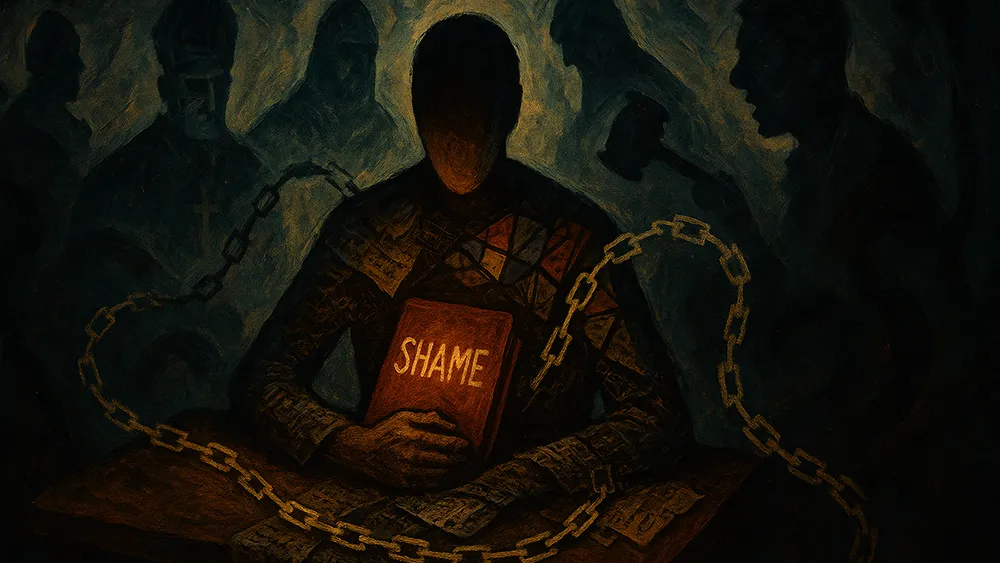Enjoying the Five-Knuckle Shuffle without Shame
Is masturbation guilt weighing heavily on your mind? You’re not alone. Millions of people struggle with feelings of shame and anxiety around this natural aspect of human sexuality.
The truth is, masturbation is a normal, healthy part of human sexual expression.
Yet, many of us carry the burden of guilt, often fueled by religious teachings, cultural taboos, or societal misconceptions. In this comprehensive guide, we’ll explore why these feelings arise and, more importantly, how to overcome them. Drawing from scientific research and expert insights, we’ll:
- Understand the psychology behind masturbation guilt
- Examine common sources of shame and anxiety
- Discover practical strategies for self-acceptance
- Learn how to develop a healthier relationship with your sexuality
Whether you’re grappling with religious concerns or cultural pressures, this guide will help you navigate these complex emotions and move towards a more balanced, shame-free perspective on self-pleasure.
Key Takeaways
- Scientific evidence confirms that masturbation is a normal form of self-exploration and sexual expression, with no inherent physical risks or negative side effects.
- Cultural and religious beliefs often contribute to shame around self-pleasure, but these views aren't supported by sexual medicine or mental health research.
- Masturbation can offer several health benefits, including stress relief, better sleep, and relief from menstrual cramps, making it a productive form of self-exploration.
- Religious OCD and scrupulosity can intensify feelings of guilt around masturbation, but these are psychological issues rather than moral failings.
- Professional help from qualified mental health providers can be beneficial for those struggling with persistent masturbation guilt or religious scrupulosity.

The Psychology of Sexual Shame
To fully understand the roots of sexual guilt, we have to get honest about where these ideas came from. Most people didn’t arrive at their shame about masturbation through personal reflection—they inherited it. These beliefs were passed down through generations like bad family recipes: outdated, overly spiced with fear, and completely lacking in nourishing truth.
What started as vague interpretations or power plays became hardened into “moral truths,” delivered from pulpits, classrooms, and dinner tables with an air of unquestionable authority.
But scratch the surface, and you’ll find the origins are anything but divine. The path from ancient texts to modern guilt is a long one—marked by mistranslations, political motives, repressed theologians, and outright manipulation.
To reclaim your relationship with your own body, it helps to demystify the stories that turned a perfectly natural act into something sinful. Let’s walk through a few of the most persistent and problematic origin stories that turned the totally normal act of polishing the ol’ pole into a supposed crime against heaven.

Origins of Sexual Guilt
Sexual shame doesn’t appear out of thin air—it’s deliberately taught. From an early age, our beliefs about sexuality are molded by the voices of authority around us: parents, preachers, teachers, and cultural leaders. These figures often pass down rigid, fear-based messages and even inventions, food, and activities designed not to enlighten, but to control.
The result? Deep-seated guilt around natural human behaviors like masturbation, embedded so early and so often that it can feel like personal failure rather than what it is: manipulation.
The people spreading these messages were usually not malicious, but they were often misinformed—and in many cases, they repeated inherited dogma without question. Yet behind their warnings and condemnations are centuries of power dynamics, moral panic, and institutional agendas.
Religious authorities and social institutions have long twisted the idea of sexual purity to maintain control over individual behavior, especially when it comes to pleasure that doesn’t serve patriarchal or reproductive purposes.
The truth is, religious texts don’t even mention masturbation explicitly. The shame surrounding it wasn’t born from divine revelation — it was manufactured by people in power. They cherry-picked interpretations, promoted fear, and constructed entire frameworks of sin around behaviors that posed no threat to anyone.
Understanding who created the guilt—and why—is the first step in dismantling it.

Damaging Religious and Cultural Origin Stories
The twisting of human experience for political power and religious gain has spanned across the centuries and throughout many cultures. Here are four specific stories that explain exactly where the false narrative that Fiddling your Flesh Flute was considered sinful originated.
- The Story of Onan (Genesis 38:9–10) – This is one of the most commonly cited biblical passages against masturbation, yet it’s often misused. Onan “spilled his seed on the ground” and was punished by God—not for masturbation, but for disobeying a specific cultural and familial duty to provide offspring for his deceased brother’s widow (a practice called levirate marriage). Religious leaders later twisted this passage to broadly condemn any “waste” of semen, despite the original context having nothing to do with masturbation or even general sexual morality.
- Augustine’s Doctrine of Original Sin (4th–5th century CE) – Saint Augustine’s personal guilt and internal conflict about his own sexual desires heavily influenced Christian teachings for centuries. He framed sexual pleasure—especially when separated from procreation—as inherently sinful. This philosophical framework laid the groundwork for institutional shame around masturbation, despite no explicit biblical prohibition. His ideas became canonized and echoed through generations of Church doctrine.
- Victorian-Era Christian Morality – During the 19th century, especially in Europe and North America, masturbation was labeled as morally corrupt and physically dangerous based on pseudoscience and cultural repression, not scripture. Religious leaders joined forces with early medical authorities to scare people into sexual suppression. Pamphlets warned that masturbation could lead to madness, disease, or damnation. These teachings focused on social control, rather than spiritual truth, but their effects still linger in religious communities today.
- Islamic Interpretations of Hadith – In some Islamic traditions, masturbation is considered makruh (discouraged) or even haram (forbidden), but this varies widely depending on the scholar or sect. These interpretations usually aren’t based on the Qur’an itself—which doesn’t mention masturbation—but on hadith (sayings attributed to the Prophet Muhammad) that are vague or contextually debatable. As with Christianity, it’s more about human interpretation than divine decree.
Now, let’s take a step back and ask whether Jesus, Augustine, or Mohammad paddled their pickles. The answer is pretty simple if they had a penis and went through puberty. Why would they be any different than every male in history? Now think about it. If they NEVER said anything about spanking their monkeys, maybe they just enjoyed a good round of stroking their salami whenever they felt like it!

Impact on Mental Health
The burden of sexual shame can significantly affect mental well-being, manifesting as anxiety, depression, or compulsive behaviors. When someone constantly battles feelings of guilt about their sexual desires, it can create a cycle of shame that impacts their overall psychological health.
This psychological issue often extends beyond individual moments of shame, potentially affecting:
- Self-esteem and self-worth
- Intimate relationships and communication
- Overall emotional well-being
- Sexual health and satisfaction
- Erection Quality and Capability
- Personal identity and self-acceptance
The impact of sexual shame can be particularly severe when combined with pre-existing mental health conditions, creating additional layers of distress and anxiety. Many individuals find themselves caught in a pattern of shame, guilt, and self-judgment that can be challenging to break without professional support.
Research shows that addressing sexual shame through therapy and self-compassion work can lead to significant improvements in mental health outcomes. Understanding that these feelings are common and working through them with professional guidance can help individuals develop a healthier relationship with their sexuality.

Woody Urges You To Remember
Sexual shame, rooted in cultural and religious influences, can significantly impact mental health, but recognizing its origins and seeking professional support if needed can help break the cycle of guilt and promote healing.
Breaking Free from Masturbation Guilt
Guilt has a way of lingering long after the act is over—especially when it’s been drilled into you that something as natural as masturbation is shameful.
But here’s the truth: that guilt isn’t yours. It was handed to you by culture, by religion, by authority figures who themselves were often repeating inherited dogma without question. Breaking free from masturbation guilt isn’t about justifying a habit—it’s about reclaiming your right to understand and experience your own body without fear, shame, or self-loathing.
This part of your journey is about unlearning, untangling, and ultimately undoing the toxic narratives that were never rooted in truth to begin with.
It’s not easy. Shame thrives in secrecy, and undoing years of internalized judgment takes intentional effort. But the moment you start challenging the source of those beliefs, the moment you realize that guilt is not a moral compass but a social construct, you begin to take back control.
And that is where real healing starts. Let’s dive into some options for claiming your birthright to a healthy sexual self-image.

The Do-It-Yourself Approach (Pun Intended!)
To deal with the shame that has become embedded in your mind effectively, the first step is understanding that masturbation is a normal, healthy part of human sexuality. It doesn’t make you broken, perverted, or weak. Acknowledging this fact helps reframe the behavior as something natural rather than shameful. Repeating this idea to yourself—even writing it down—can begin to disrupt the mental loop of guilt that often follows.
One powerful tool for eliminating guilt is self-reflection. Ask yourself where the guilt is coming from. Did a parent, teacher, or religious leader tell you it was wrong? Are you comparing yourself to an idealized version of how a “disciplined” person should behave?
Once you identify the source, you can begin to question its validity.
Not all inherited beliefs deserve a permanent place in your life. If your values have shifted or evolved, it’s okay to let old judgments go.
Mindfulness can also play a huge role in letting go of guilt. When the feeling arises, don’t shove it down or beat yourself up. Instead, observe it without judgment. Notice how it feels in your body and what thoughts accompany it. Then, remind yourself: “I am not doing anything wrong. I am learning to accept myself.” This kind of emotional honesty, paired with kindness toward yourself, makes guilt lose its grip over time.
Another helpful approach is changing the way you talk to yourself. Instead of using harsh inner language like “I shouldn’t have” or “What’s wrong with me,” use more compassionate phrasing: “I’m exploring what feels good,” or “This is part of my journey to understanding myself.”
Language shapes our emotions, and shifting your self-talk from condemnation to acceptance can help reduce the emotional weight of the experience.
Finally, it helps to place masturbation in a broader picture of self-care. You brush your teeth, exercise, maybe even meditate—why should caring for your sexual well-being be any different? When you treat your sexuality as something to respect and explore, rather than control or hide, guilt naturally starts to fade. You may not need a therapist to reach that point—just patience, curiosity, and a willingness to rewrite the script you’ve been handed.
In due time, you’ll develop a healthy curiosity about your penis and sexuality and begin to love the time you spend in solo sexual play.

Get Clear on the Religious Manipulation of Your Thinking
From a moral and spiritual standpoint, the idea that private, consensual, and non-harmful sexual activity is a “sin” just doesn’t hold up at all.
Masturbation causes no harm, violates no one’s rights, and can even promote self-awareness and mental well-being. Labeling it sinful implies that pleasure itself is shameful—especially solo pleasure—and that simply isn’t aligned with a loving, compassionate view of human nature.
If a belief system teaches that self-love and self-exploration are inherently wrong, it’s worth asking whether the system is truly serving your humanity or stifling it.
Moreover, the rigid moral stance against masturbation usually causes far more harm than the act itself. Guilt, anxiety, secrecy, and shame—all of which are spiritually corrosive—are common byproducts of these teachings.
Any belief that disconnects you from your body or teaches you to hate your natural urges is not a pathway to spiritual wholeness; it’s a path to self-denial.
If anything, masturbation can be seen as a form of self-connection, self-soothing, and even gratitude for the body you’ve been given. That’s not a sin. That’s being human.

Seek Professional Support if Needed
When dealing with masturbation guilt, seeking professional help can be a transformative step toward healing and self-acceptance. Mental health experts specializing in sexual health and anxiety disorders offer various evidence-based approaches to address feelings of guilt and shame.
One of the most effective treatments is Exposure and Response Prevention (ERP) therapy. This best treatment method helps individuals confront their fears and anxieties about masturbation while preventing harmful response patterns that perpetuate guilt. Through guided sessions, therapists help you develop healthier thought patterns and coping mechanisms.
Licensed sex therapists provide a safe, judgment-free space to explore the root causes of masturbation guilt. They can help you understand how past experiences, religious beliefs, or cultural influences may have shaped your current feelings. These professionals are trained to address complex emotions while maintaining complete confidentiality.
Support groups led by qualified counselors offer another valuable resource. Connecting with others who share similar experiences can help normalize your feelings and provide practical strategies for overcoming shame. These groups often combine educational components with peer support, creating a comprehensive healing environment.
Cognitive Behavioral Therapy (CBT) specialists can help you identify and challenge negative thought patterns about masturbation. They work with you to develop more balanced, realistic perspectives while teaching practical techniques for managing anxiety and guilt.
Some individuals find relief through working with religious counselors who specialize in sexuality and faith-based concerns. These professionals can help bridge the gap between religious beliefs and sexual health, offering perspectives that promote both spiritual and emotional well-being. However, be very cautious as you approach this kind of therapist, as some religious counselors pitch their services from one perspective, change positions during therapy, and make your feelings of guilt and shame even worse.
Remember, seeking professional support isn’t a sign of weakness – it’s a courageous step toward better mental health and self-acceptance. These experts have the training and experience to guide you through the process of breaking free from masturbation guilt using proven therapeutic approaches.

Woody Supports Professional Therapists
Professional support offers evidence-based treatments like ERP and CBT, providing a safe space to address masturbation guilt while developing healthy strategies for long-term emotional well-being.
Conclusion or Learning to Enjoy the Climax
As we’ve explored throughout this guide, masturbation guilt is a complex emotional challenge that affects many individuals, but it doesn’t have to control your life.
Remember that self-pleasure is a natural, healthy aspect of human sexuality, supported by scientific evidence and medical professionals worldwide.
By understanding the root causes of your guilt, whether they stem from religious teachings, cultural pressures, or personal beliefs, you can begin to develop a healthier relationship with your sexuality. The journey to self-acceptance may take time, but it’s worth pursuing for the sake of your mental and emotional well-being.
If you’re struggling with persistent guilt or religious OCD related to masturbation, don’t hesitate to seek support from qualified mental health professionals. They can provide valuable guidance and evidence-based strategies to help you overcome these challenging feelings.
You deserve to live free from shame and embrace your natural sexual expression with confidence and self-compassion.

Solo Sexuality FAQs
Can masturbation affect my future sexual relationships?
No, healthy masturbation doesn’t negatively impact future sexual relationships. In fact, self-exploration helps you understand your body better, leading to more satisfying sexual experiences with partners. It’s a productive form of self-exploration that can enhance sexual pleasure and communication.
Will masturbating affect the size and shape of my penis?
No, masturbating will not affect the size or shape of your penis. That’s a common myth with no scientific basis. Masturbation is a normal and healthy sexual activity that doesn’t cause permanent changes to your anatomy or create any penis problems. Temporary swelling or redness may occur immediately after, due to increased blood flow or friction, but these effects typically subside within a short period. Your penis will continue to look and function the same regardless of how often you masturbate.
Jerking off also does not impact your ability to achieve or maintain an erection, will not permanently reduce your testosterone level, nor does it affect your refractory period. A healthy relationship with your cock can also lead you to deeper exploration of your own sexuality including how to get a harder penis. Plus, maintaining a healthy ejaculation frequency can also improve the flavor of your semen.
Is masturbation addiction a real concern, and how can I tell if I’m addicted?
While masturbation addiction isn’t officially recognized as a mental health condition, compulsive behavior can be problematic. Signs include interference with daily life, relationships, or work. If concerned, track your habits and consider speaking with a mental health professional who specializes in sexual medicine.
How can I discuss masturbation guilt with my religious counselor or spiritual advisor?
Approach the conversation within the context of your religious values while being honest about your feelings. Many religious leaders today take a more nuanced approach to sexual health. Prepare specific questions and focus on aligning your physical needs with your moral beliefs.
However, be prepared to step away from these types of advisors if you begin to feel as if they prioritize religious dogma over your emotional health. Even the best-intentioned counselor may let antiquated theology and judgmental viewpoints creep into their sessions with you.
Does masturbation frequency affect physical or mental health?
Masturbation frequency can influence both physical and mental health—but it largely depends on the context and the individual.
Physically, moderate masturbation is harmless and offers benefits like improved sleep, reduced stress, and better sexual function. Frequent ejaculation has been associated with a reduced risk of prostate issues. That said, excessive frequency—especially when it interferes with daily responsibilities or causes physical discomfort—may signal an underlying issue, such as using masturbation as a coping mechanism for stress or emotional distress.
Mentally, how often you masturbate isn’t inherently good or bad—it’s your relationship to the behavior that matters. Masturbating regularly in a healthy, mindful way can promote body awareness, reduce anxiety, and improve self-esteem. But if it’s accompanied by guilt, secrecy, or compulsive patterns, it may negatively impact mental well-being.
The key is balance: if masturbation enhances your life and doesn’t cause distress or interfere with meaningful relationships and goals, it’s likely a healthy part of your routine.
What are healthy ways to manage sexual urges without feeling shame?
Managing sexual urges in healthy, shame-free ways begins with understanding that sexual desire is a natural part of being human. It doesn’t make you immoral, broken, or weak—it just makes you alive. A healthy relationship with your sexuality starts by accepting that urges will come and go, and that how you respond to them matters more than trying to suppress or judge them.
One effective approach is to channel sexual energy into intentional, self-respecting outlets. This might include solo sexual expression like mindful masturbation, where you focus on what feels good without guilt or rushing. For some people, redirecting energy into creative pursuits, exercise, or relaxation techniques can help manage the intensity of the moment while still honoring the underlying need for connection or release.
Mindfulness and emotional self-awareness are also essential tools. Instead of reacting to urges automatically or trying to shut them down, take a moment to explore what you’re really feeling. Are you bored, lonely, stressed, or just in need of physical pleasure? Naming the emotion can take away its power and help you respond in a way that aligns with your values, not someone else’s outdated rules.
Finally, reshape your internal narrative. Replace harsh self-talk like “I shouldn’t feel this way” with affirmations like “My sexuality is part of me, and I can choose how to express it.” The goal isn’t to eliminate sexual urges—it’s to integrate them into a balanced, empowered life where guilt and shame don’t get the final word.





